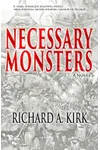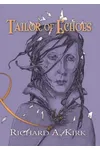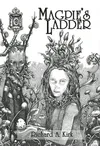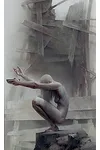Picture a Canadian storyteller who conjures chimerical creatures and haunting landscapes from the depths of imagination—meet Richard A. Kirk! A maestro of fantasy and speculative fiction, Kirk blends intricate artwork with narratives that dance between reality and the surreal, crafting worlds that linger long after the page is turned. His novels like The Lost Machine and collections like Magpie’s Ladder showcase a mind shaped by nature’s wonders and industrial echoes, making him a hidden gem in the genre.
Born in 1962 in Kingston upon Hull, England, Kirk moved to Canada as a child, where the stark contrast of Lake Huron’s natural beauty and the petrochemical industry’s flares sparked his creative fire. This duality fuels his work, weaving organic forms with fantastical machinery in both his stories and illustrations.
The Making of Richard A. Kirk
Growing up in a town where industrial refineries met the untamed shores of Lake Huron, Kirk was captivated by the interplay of nature and technology. As a shy, bookish child, he devoured weird fiction by H.P. Lovecraft and John Crowley, finding escape in their lush, otherworldly settings. Illustrators like Mervyn Peake and Aubrey Beardsley inspired his early art, honing his meticulous style in ink, graphite, and silverpoint. Kirk’s career began as a visual artist, illustrating for authors like Clive Barker and China Miéville, before he ventured into writing, channeling his visual imagination into prose.
Richard A. Kirk’s Unforgettable Stories
Kirk’s storytelling is a tapestry of the bizarre and philosophical, often set in decaying, layered worlds where past technologies are mistaken for magic. His debut novella, The Lost Machine (2010), follows Lumsden Moss, an ex-convict navigating a plague-ravaged wasteland to confront a killer, armed only with notebooks of murdered children’s memories. Its haunting prose and stark imagery set the stage for Kirk’s Lumsden Moss sequence, continued in Necessary Monsters (2017), a sprawling novel where Moss unravels mysteries in a world scarred by a war between magic and science.
Magpie’s Ladder (2019), an illustrated short story collection, showcases Kirk’s ability to craft compact yet evocative tales. From a researcher drawn to the dreamlike Darkling Lands to a young woman opening a sealed house on a crumbling bridge, these stories explore yearning and the fragile line between human and monster. His 2021 novel, Tailor of Echoes, delves into a transforming City of Steps, where architect Adrian Peak quests for a mystical document, blending fantasy with dark magic. Kirk’s monochromatic art, rich with morphing forms, complements his prose, creating a seamless fusion of visual and narrative art.
Kirk’s style is marked by meticulous detail and metamorphosis, reflecting his fascination with natural processes. His worlds are alive with bizarre creatures and philosophical questions, inviting readers to ponder humanity’s place in the fantastical. Critics note a melancholic beauty in his work, though some find its dense, disconnected prose challenging, making it a niche but rewarding read for weird fiction fans.
Why Richard A. Kirk Matters
Richard A. Kirk’s impact lies in his ability to bridge art and literature, crafting immersive worlds that challenge conventional fantasy. His work resonates with readers who crave speculative fiction that’s as thought-provoking as it is visually striking. By illustrating for luminaries like Frank Herbert and Caitlín R. Kiernan, Kirk has left a mark on the genre, while his own stories push boundaries, blending horror, science fiction, and fantasy. His growing cult following and international art exhibitions signal a legacy that’s only beginning to unfold.
- Born: 1962, Kingston upon Hull, England
- Key Works: The Lost Machine, Necessary Monsters, Magpie’s Ladder, Tailor of Echoes
- Notable Illustrations: Clive Barker’s Weaveworld, Frank Herbert’s Dune
- Current Residence: London, Ontario, Canada
Ready to dive into a world where creatures morph and landscapes pulse with mystery? Snag The Lost Machine or Magpie’s Ladder and let Richard A. Kirk’s speculative fiction sweep you away!



